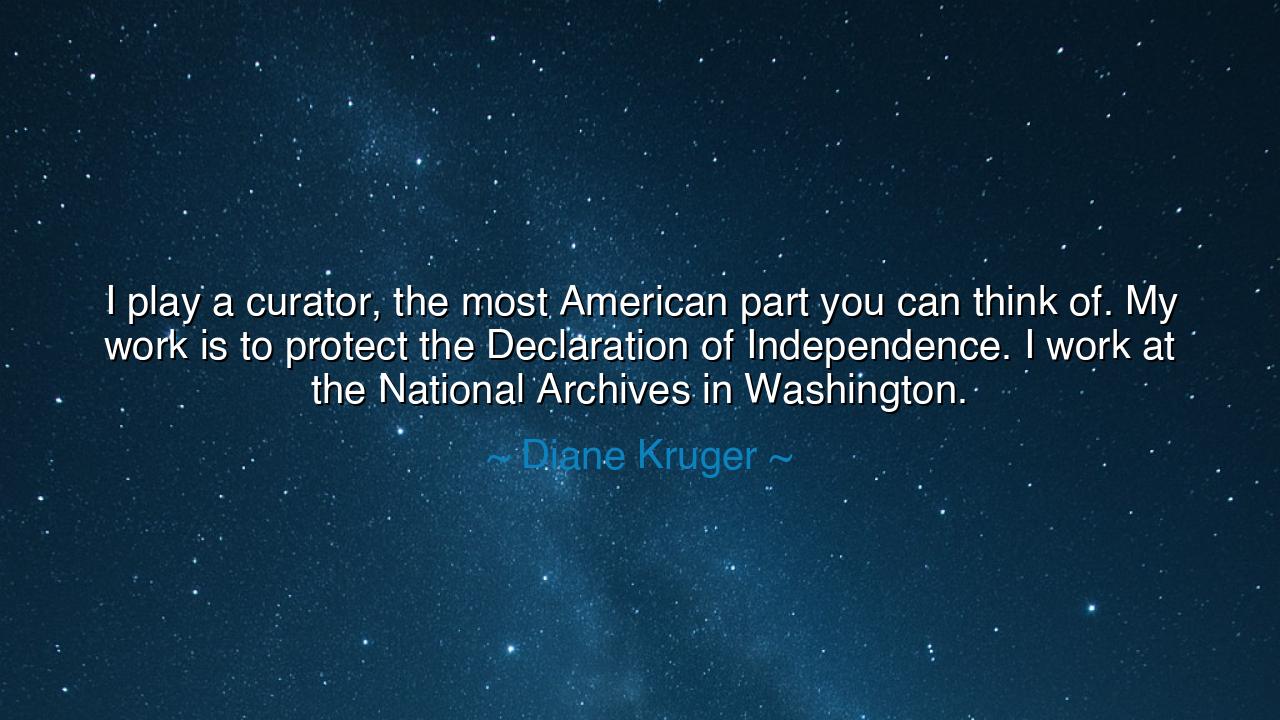
I play a curator, the most American part you can think of. My
I play a curator, the most American part you can think of. My work is to protect the Declaration of Independence. I work at the National Archives in Washington.






The Keeper of a Nation’s Soul
Hear the words of Diane Kruger, spoken not as boast but as reverence:
“I play a curator, the most American part you can think of. My work is to protect the Declaration of Independence. I work at the National Archives in Washington.”
Though born from the tongue of an actress describing her role, these words carry the gravity of a sacred calling. For to protect the Declaration of Independence is not merely to guard parchment behind glass; it is to guard the heartbeat of a nation, the dream written in ink that gave birth to liberty itself. In her statement lies a deeper truth—that those who preserve the past safeguard the future, and that the guardians of memory hold a power as vital as the heroes who once made history.
The Meaning of the Curator’s Calling
To be a curator is to be both protector and storyteller. The word, drawn from the Latin curare, means “to care for.” And indeed, what greater care can there be than to tend to the living memory of freedom? When Kruger speaks of her role as “the most American part you can think of,” she touches upon the essence of national identity—not in warfare or conquest, but in preservation. For America was not born from a crown or an empire, but from words—words of equality, justice, and self-determination.
Thus, to protect those words is to stand watch over the spirit of a people. The Declaration of Independence, though silent and still, breathes through every citizen who values liberty, and it requires its curators—not only in museums, but in every generation—to keep its promise alive.
The Origin and Symbolism of the Quote
Kruger’s statement finds its root in her portrayal in the film National Treasure, where she plays Dr. Abigail Chase, a scholar and protector of the Declaration. Yet even beyond fiction, her words awaken something profound. They remind us that history is not inert—it lives in the stewardship of those who guard it. In the great halls of the National Archives in Washington, D.C., the founding documents rest not as relics, but as sacred testaments to human courage and vision.
To stand before them, as Kruger’s character does, is to feel the weight of centuries—the hands that wrote, the hearts that fought, the generations that hoped. In that quiet chamber of parchment and glass lies not just America’s beginning, but its enduring challenge: to live worthy of those words.
The Parallel of Ancient Guardians
In the ancient world, too, civilizations understood the sacredness of preservation. The scribes of Egypt tended to the scrolls of wisdom, ensuring that no law or prophecy was lost to time. The librarians of Alexandria guarded the knowledge of nations, believing that the loss of memory was the death of civilization. So too does the curator stand as a bridge between past and present, ensuring that truth endures even when the world forgets.
Diane Kruger’s reflection, though born in art, channels this timeless duty. She reminds us that to be a guardian of history is a noble and deeply human act—to see not only what has been, but what must continue to be. Every society survives only as long as its stories are remembered.
The Symbol of the Declaration Itself
The Declaration of Independence is not a mere document; it is a mirror of the eternal struggle between oppression and freedom. It begins with simple words—“We hold these truths to be self-evident”—and in them, the courage of an entire people was declared to the world. To protect that Declaration is to protect the idea that truth itself can be written down, claimed, and defended.
Throughout history, there have been countless attempts to silence such truths—to burn books, erase records, rewrite the past. But always there have been curators, librarians, teachers, and keepers who stood in the gap, preserving the light of knowledge against the darkness of forgetting. Kruger’s “most American part” thus becomes universal—a symbol of all who choose to defend ideals rather than weapons, memory rather than power.
The Lesson of the Guardian’s Task
From this reflection emerges a lesson for all who live in this age of noise and neglect: we must each become curators of what is sacred. It is not enough to revere freedom; we must understand it. It is not enough to inherit history; we must preserve it. Whether through education, storytelling, or simple remembrance, every person holds the power to protect the fragile truths upon which humanity depends.
Ask yourself—what do you guard? Is it truth, justice, kindness, wisdom? For these too are declarations—written not on parchment, but upon the soul. Let them not fade. Let each generation find its curators, its guardians of memory, its keepers of light.
The Eternal Duty of Preservation
Thus, Diane Kruger’s words, though framed by fiction, rise to the level of ancient teaching. The curator stands as both sentinel and servant, protecting what is greater than herself. The Declaration of Independence, though centuries old, remains the living covenant of a people who dared to define their destiny. To protect it—literally or symbolically—is to honor the flame of liberty that has guided humanity through the ages.
So, children of tomorrow, remember this: freedom survives through remembrance, and remembrance survives through care. Be curators of your culture, guardians of your values, and protectors of the truths that make you human. For the archives of every nation and of every heart depend upon the faith of those who choose to remember.






AAdministratorAdministrator
Welcome, honored guests. Please leave a comment, we will respond soon